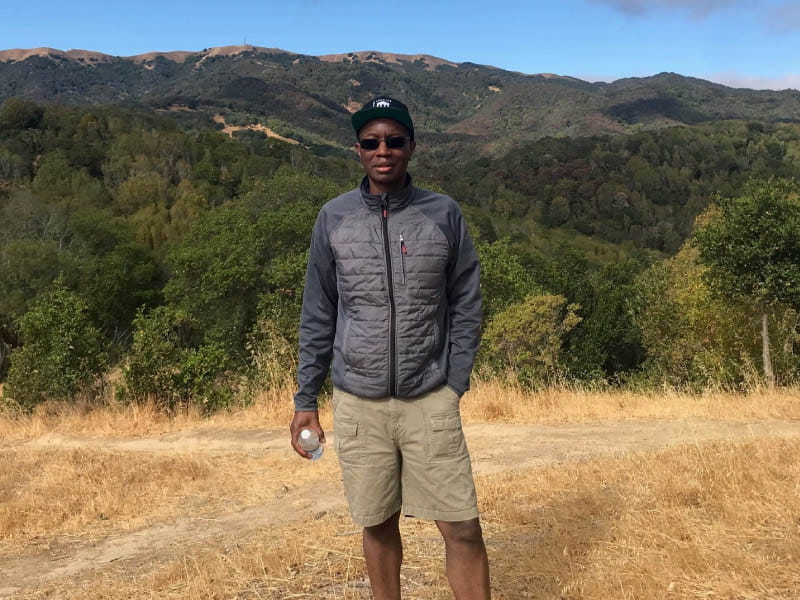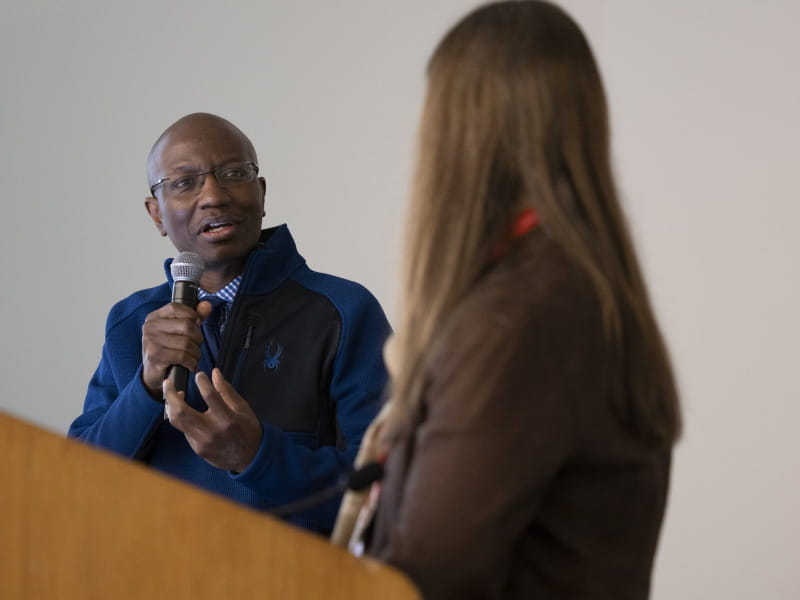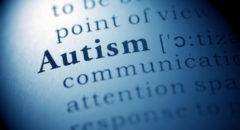
Few people know more about stroke prevention and brain health than neurologist and epidemiologist Dr. Bruce Ovbiagele. And one of the first things he'd like you to know is that you have a "tremendous" amount of control over your own stroke risk.
Most strokes are preventable, says Ovbiagele, a professor of neurology and associate dean at the University of California, San Francisco. "And what needs to be done is all within our power to do."
Ovbiagele – who is chief of staff at the San Francisco Veterans Affairs health care system, holds professorships on four continents, serves as editor-in-chief of the Journal of the American Heart Association, and has published more than 600 research articles – does a lot to protect his own brain health. But even for him, parts of doing so can be a challenge.
He discussed his routine for "The Experts Say," an American Heart Association News series where specialists explain how they apply what they've learned to their own lives. (The conversation has been edited.)
What's the most important thing someone should know about stroke?
One, what it is. Many people are not aware of what a stroke actually is, what part of the body is affected, and how devastating it can be.
(A stroke occurs when a blood vessel to the brain is either blocked or ruptures, starving the brain of oxygen. Stroke is the fifth-leading cause of death in the United States and a top cause of disability worldwide.)
Two, that it's preventable. It's well within our own ability to actually prevent strokes.
RELATED: Act “FAST”: Recognize the Signs of a Stroke
What do you tell your patients about prevention?
First of all, I encourage them to eat a healthy diet. A diet that is well-aligned with the Mediterranean diet – that is, a diet that has fruits, nuts and vegetables and judicious use of olive oil – has been shown to reduce a person's risk of experiencing a stroke.
Exercise is important because physical activity lowers blood pressure, keeps weight down and better controls the way the body can control blood sugar, or glucose. So, at the very least, moderate exercise most days of the week, for about 30 minutes each time, can be helpful in reducing the risk of stroke.
Trying to avoid stress to every extent possible can be helpful. Complying with your doctor's recommendations is also very, very important.
The last thing I'd say is making sure that one is aware of one's numbers. And by numbers, I mean making sure that one goes for routine care and tries to make sure they're aware of their cholesterol, blood sugar and especially blood pressure, because that is the primary modifiable risk factor for a stroke.
What are some of the factors not in their control?
Age is the biggest one. We know that for every decade after the age of 55, the risk of experiencing a stroke doubles.
The other thing is race. We've known for almost 60 years that people of African ancestry in this country are at substantially higher risk of experiencing, and unfortunately dying from, a stroke compared to their non-Hispanic white counterparts. About half of that excess risk can be explained by lifestyle factors. But the other half, we still cannot explain.

RELATED: 16 Foods That Prevent Memory Loss
How does your own lifestyle line up with your advice?
I try to exercise every day. I do a little bit of modest resistance training by doing pushups. I work out on a stationary bike, as well. I don't always succeed in doing that every day, but I try to do it at least four or five days a week.
I don't like exercise just being routine. So, when I do exercise on my bike, I do it to music.
Hiking with my spouse is one of my big things. I love doing things in nature. And hiking, I think more than anything else, has been a way to be more physically active and also to just unplug.
Beyond the regular exercise – which is important – I incorporate a healthy lifestyle into the activities that I do. As I'm speaking to you right now, I'm standing. I have a standing desk, so I try to make sure that I stand most of the time unless there's a compelling need to sit.
I take the staircase almost all the time unless there's some compelling reason not to. I'm notorious for doing that in every workplace that I've been. But I do that all the time – and encourage my colleagues to do so, as well.
What else do you do on a daily basis?
I try to get at least five servings of fruits or vegetables in. If I'm feeling a little peckish, I nibble on almonds. I try not to do too much of that. But I do nibble, and that helps me feel a little more full.
Tapping into that Mediterranean diet, I love fish, and fish oils are very protective for the blood vessels. I'm not a vegetarian, but I eat very little meat. I do eat chicken once in a while.
I try to maintain a positive attitude. Several studies have shown that people who tend to have a more upbeat attitude tend to live longer.
And I make it a point to know my numbers and make sure they are under control.
You're incredibly busy. You teach around the world, and you've earned advanced degrees in medicine, law, business and more. How do you manage to fit in exercise?
I will say that I could do better. But one of my strengths is that as much as possible, I really try to do things that I enjoy. I love learning. Some people might see that as onerous, but that actually fuels me.
Sometimes I feel I've never really balanced things properly. But I will say that I try to mostly do things that fuel me.
Is there a direct benefit to brain health from staying intellectually engaged?
Absolutely. When you look at lifestyle factors in terms of reduced risk for Alzheimer's disease, you find that people who were exposed to a lot of cognitive stimulation – reading, writing, engaging – tend to be at lower risk.
One of the things I try to do is read quite a bit. I always have a book that I'm reading, usually nonfiction.
In terms of your own routine, is there anything you could do better?
We've realized that sleep is very important for cardiovascular health. I'm passionate about doing things, and I love what I do. But I think I would like to improve in that area by doing a little bit less so that I can have full and restful sleep. Because increasing data are showing how the duration of your sleep and the number of times you wake up at night potentially could be associated with poorer brain health and an increased risk of stroke or heart attack.
I get no more than five hours, and we're increasingly finding that although there might be differences, adults need at least a good seven, eight hours of sleep.
What else do you wish people understood about stroke risk?
Strokes used to be called cerebrovascular accidents. They are not accidents. Thankfully, that nomenclature was stopped.
But even "stroke," I feel sometimes, has the connotation of "a stroke of bad luck." It's actually not, in most cases. It's really an opportunity for us to live our lives a little bit better, so that we're healthier for longer.
By American Heart Association News









